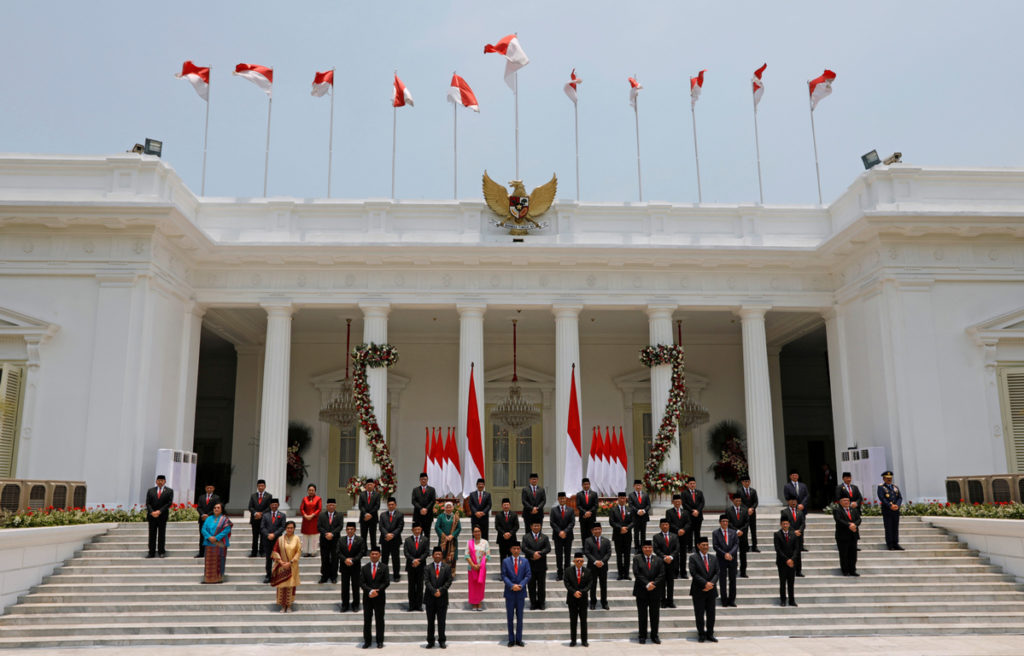
Indonesian president expected to focus on managing economy over next 5 years
Indonesian President Joko Widodo seeks to set the country on course to an advanced economy as he starts his second five-year term with a new Cabinet for development and enhancing international cooperation.
His “Onward Indonesia” new Cabinet is generally seen as strong and well balanced as he has retained his economics team from his first Cabinet and added new faces, including his erstwhile rival in the April presidential election, Prabowo Subianto, who takes over as defense minister.
The new lineup “reflects a mixture of political compromise and the need for strong economic leadership,” said Rajiv Biswas, Asia Pacific chief economist with London-based global information firm IHS Markit.
Bringing in opposition leader Subianto into the new government will go a long way toward healing the bitter postelection political divisions that were creating unrest in the nation, he said. And on the economic front Widodo has also made some interesting appointments unveiled on Oct 23.
The president aims to speed up economic development with the appointment of young entrepreneur Nadiem Makarim, founder of Gojek, as culture and education minister and Wishnutama Kusubandio, co-founder of NET TV, as minister of tourism and creative economy.
The president’s decision to retain former World Bank executive Sri Mulyani Indrawati as finance minister and his old political ally, Luhut Pandjaitan, as coordinating minister for maritime affairs, natural resources and investment give a clear signal to international investors and the business community that Indonesia will continue on its course of economic growth and stability.
Wellian Wiranto, an economist who covers Indonesia for the Singapore-based Oversea-Chinese Banking Corporation, or OCBC, said the reappointment of Indrawati as finance minister has “rightly assured investors of a continuation of Indonesia’s orthodox fiscal policies, including measures to broaden the country’s narrow tax base”.
On Oct 25, the president told a media briefing that he wanted to expedite talks on a trade deal with the European Union and wrap up a review of trade with the United States. Joint works with China could also be updated.
’10 new Balis’
Over the next five years, Widodo is expected to focus on managing the economy, continue with his signature big-ticket infrastructure development policies and pro-poor initiatives.
The man who talked of creating “10 new Balis” and oversaw the completion of Jakarta’s first metro line in his first five years in office, now has an ambitious $33 billion plan to establish a new capital city on the island of Borneo and further develop the transport and communication links that are crucial to an archipelago that stretches across three time zones and thousands of islands.
To realize his ambition Widodo has appointed a slew of new ministers on the economic front including coordinating minister for economic affairs Airlangga Hartarto; trade minister Agus Suparmanto; state-owned enterprises minister Erick Thohir and a new head for the investment coordinating board, Bahlil Lahadalia.
The new Cabinet also lays the foundations for shifting the country’s economic reliance from resources exports to manufacturing and added-value products, so that the nation of 272 million people can move from a middle-income country to an advanced economy by around 2045.
Internationally, Widodo is expected to continue to build strong economic ties with China, notably through joint infrastructure projects.
Economic cooperation between Indonesia and China is likely to accelerate in the coming years as he continues to give high priority to development of critical infrastructure such as ports, roads and industrial parks.
China’s Vice-President Wang Qishan and Widodo discussed bilateral relations in their meeting in Jakarta on Oct 21. As a special envoy of President Xi Jinping, Wang attended Widodo’s inauguration ceremony on Oct 20.
Wang said Beijing appreciated Widodo’s commitment to promoting the comprehensive strategic partnership between the two countries, and his active support for and participation in synergizing the China-proposed Belt and Road Initiative and Indonesia’s development strategies, according to a Chinese report.



